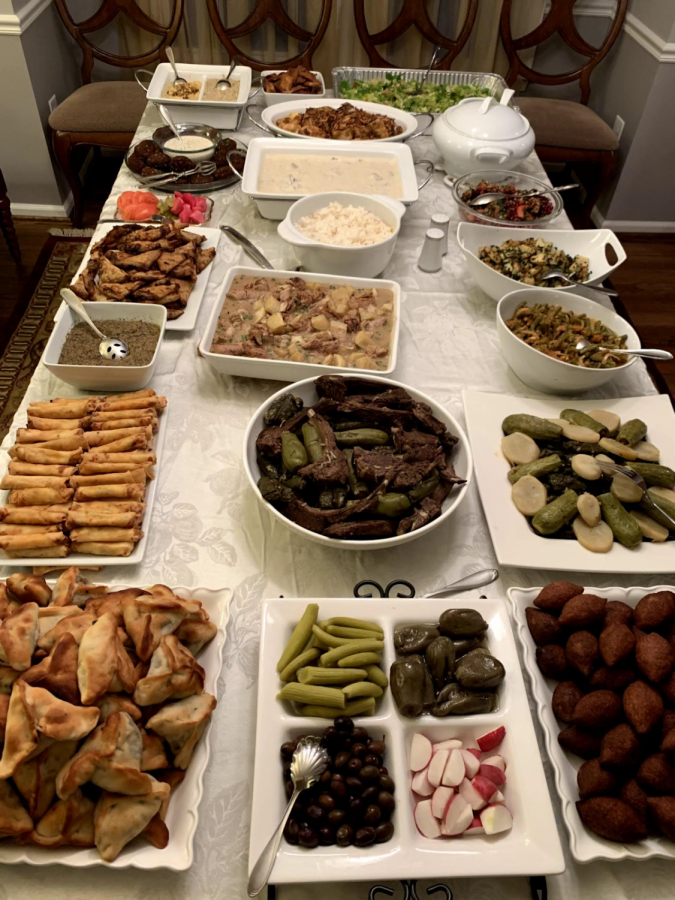“You can’t eat or drink? Not even water?”
Many Muslims are met with such questions during the month of Ramadan. From dawn to sunset, Muslims across the world abstain from eating and drinking in order to practice self-restraint, empathize with those in poverty and deepen their faith. Fasting is one of the five pillars of Islam and is mandatory for those who are mature and healthy; although in some cases, people may be exempt from fasting. During Ramadan, fasting is not a mere diet change but a comprehensive regimen of physical, moral and spiritual rejuvenation.
“There are a few habits [my family] alters during Ramadan, since the purpose of Ramadan is to encourage positive habits and avoid bad ones,” English and special education teacher Maryam Ben-Omran said. “These habits include watching less TV, avoiding idleness, reading the Quran more, giving to charity, participating in acts of kindness and being more spiritually connected.”
Muslims believe that it was the month of Ramadan during which God revealed the first verses of the Quran. These verses were revealed on the “night of power,” commonly known as لیلة القدر (Laylat al-Qadr), which was believed to have taken place during the last 10 nights of Ramadan. Hence, the last 10 days of Ramadan are considered the most spiritually significant period, and as a result, many Muslims engage in fervent prayer throughout the night.
The month of Ramadan will take place from April 13 through May 12 this year. During this month, it is common for Muslims to gather at the mosque with friends and family to stay up all night reading the Quran, praying, reflecting and socializing. However, with Ramadan taking place in the midst of COVID-19 this year, many Muslims will likely avoid attending large gatherings at the mosque and will opt to strengthen their faith at home with family.
“My favorite part about Ramadan is resetting my overall well-being and holistically re-grounding,” Ben-Omran said.
Fasting is a practice that is widely recognized as a great testament to one’s self-discipline and self-control, even though it may be hard for some. However, after all their self-restraint, Muslims are rewarded with a meal at sunset which is referred to as إفطار (iftar).
“My experience with fasting is that it’s easier than it looks. I get to eat and drink when the sun comes down. Many people have told me that they could never do it, but I actually recommend everyone to try it at least once,” senior Noor Chouman said. “It’s so fulfilling to have fasted an entire day to then be able to have a nice meal; it makes you feel grateful that you even have a meal at the end of the day to look forward to. Not everyone is lucky enough to know when their next meal will be.”
Since one of the goals of Ramadan is to teach the hardships of poverty, Muslims often donate large amounts to charity during this month. Almsgiving, or زكاة (zakat) in Arabic, is another one of the five pillars of Islam and is mandatory for all Muslims who can afford to donate. This religious requirement is to remind Muslims to stay grateful and humble, knowing that God has provided them all their blessings in life.
“During this month, I try to be more thankful for my family, friends, the roof over my head and food to eat,” Chouman said. “Overall, Ramadan makes me reflect on my own blessings. I also feel a stronger connection with my Muslim community, not only through fasting, but through our prayers. Another thought I get during every iftar is about all the billions of Muslims around the world who are probably eating at the exact same time as me; that’s just crazy to think about.”
This year, Ramadan will end on May 12 with Eid-al-fitr, the celebratory holiday that marks the end of fasting during which the Muslim community rejoices, gives gifts and enjoys plenty of delicious food.
For those looking to wish a “blessed Ramadan” to family and friends, a simple رمضان مبارك (Ramadan Mubarak) works perfectly. So for all those celebrating, Ramadan Mubarak.
